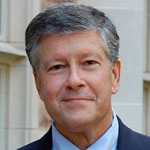Henry L. “Roddy” Roediger III, PhD, an internationally recognized scholar of human memory and the James S. McDonnell Distinguished University Professor in Arts & Sciences at Washington University in St. Louis, has received the William James Fellow Award from the Association for Psychological Science (APS).

Describing Roediger as “one of the world’s best known and most respected researchers in cognitive psychology,” the APS presented him with its highest honor during the association’s annual convention in Chicago May 24-27.
“Roediger’s contributions to the science of psychology are sustained, wide-ranging and an example of the very best of psychological science,” said Douglas L. Medin, then-president of the APS and a cognitive psychologist at Northwestern University.
“Even that is an understatement because Roddy has also been such an outstanding leader in the psychological community,” he says. “His ideas formed the basis of several of the most successful journals in psychology. His collaborations with other leading scientists serve as a model for the way modern psychological science is conducted.
“We were delighted to present Roddy with our highest scientific honor.”
Named for one of the most influential pioneer theorists in psychology, the William James Fellow Award honors recipients for a lifetime of significant intellectual contributions to the basic science of psychology. Other 2012 recipients of the award are Ellen Berscheid, PhD, of the University of Minnesota and Elaine C. Hatfield, PhD, of the University of Hawaii at Manoa.
In its description of Roediger’s contributions, the APS credits his work with fundamentally shaping the science of memory:
“His original and creative experimental observations and theoretical ideas have profoundly influenced what is now known and believed about some of the most enduring problems that have faced explorers of memory ever since Hermann Ebbinghaus’ pioneering work in the 19th century. These problems can be encapsulated in the question, ‘What is memory?’ ”
Several lines of Roediger’s disciplined, purposeful, systematic and theory-driven experimental work have produced results that illuminate and clarify that question. His best known and most influential work has to do with the phenomenon commonly known as “false memory” — the fact that it is possible for perfectly healthy and intelligent people to remember, sometimes vividly remember, events that never happened.
“His research has decisively transformed the very concept of memory,” the APS concludes.
Roediger joined WUSTL in 1996 as chair of the Department of Psychology in Arts & Sciences, a position he held for two terms until 2004, when he was named dean of academic planning in Arts & Sciences.
He stepped down from that position in 2010, a few months before receiving the Arts & Sciences Distinguished Leadership Award, which recognizes faculty who go beyond the normal demands of teaching and research and dedicate their time, energy and expertise to the advancement of Arts & Sciences and the university. He also was honored with WUSTL’s Arthur Holly Compton Faculty Achievement Award in 2008. He currently serves as a Faculty Fellow with the Office of the Provost.
An experimental cognitive psychologist whose research is concerned with human learning and memory, Roediger has published more than 250 articles, chapters and reviews and has written or edited 11 books. Three are textbooks that have been through a combined 22 editions.
He has served as president or chief executive officer of the American Psychological Society, the Experimental Psychology Division of the American Psychological Association, the Midwestern Psychological Association, the Psychonomic Society and the Society of Experimental Psychologists. A fellow of the American Academy of Arts and Sciences and the American Association for the Advancement of Science, he has edited two major psychology journals and serves on the editorial board of 12 journals.
In 2008, the Society of Experimental Psychologists also awarded Roediger its highest honor, the Howard Crosby Warren Medal.